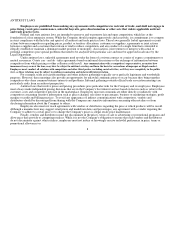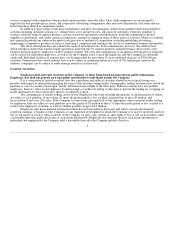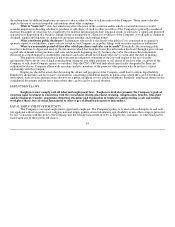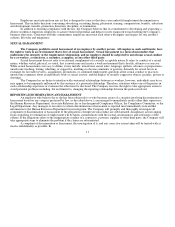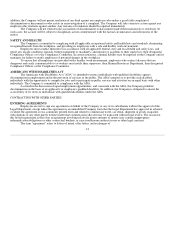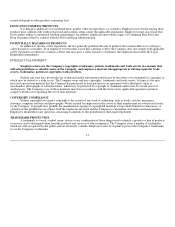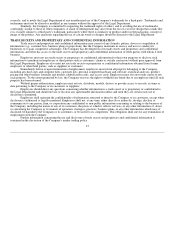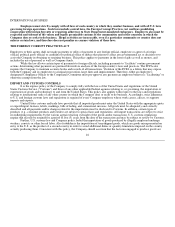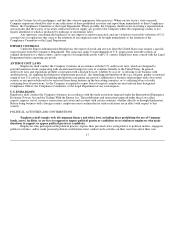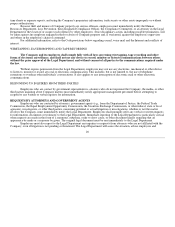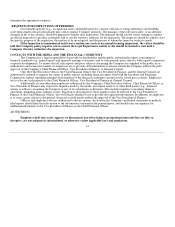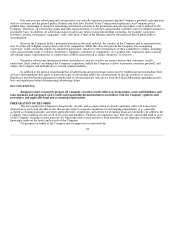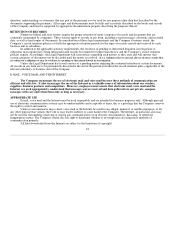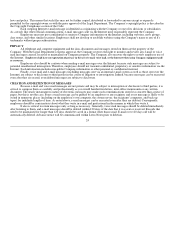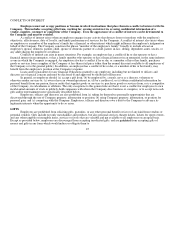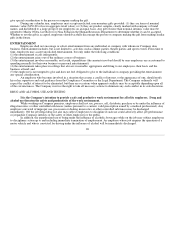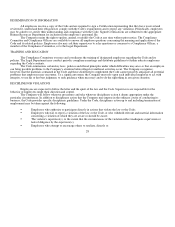Neiman Marcus 2002 Annual Report Download - page 155
Download and view the complete annual report
Please find page 155 of the 2002 Neiman Marcus annual report below. You can navigate through the pages in the report by either clicking on the pages listed below, or by using the keyword search tool below to find specific information within the annual report.
personal expense, as campaign finance and ethics laws and Company policy generally prohibit the use of Company funds, assets,
services or facilities on behalf of a political party or candidate. Unless authorized by the Company, employees who engage in such
political activities or make any public political statements must avoid any references to their affiliation with the Company or any of its
subsidiaries, and must make clear that they are acting personally and not for the Company. While there may be limited circumstances
when it is legal for the Company to make political contributions, or to reimburse employees or individuals associated with the
Company for political contributions, such contributions or reimbursements must not be made without prior approval from the
Company's General Counsel.
Various federal, state and local laws govern the conduct of persons who communicate with legislative or regulatory officials
on behalf of the Company with the intent to persuade such officials to support the interests of the Company. Although such
communications (often referred to as "lobbying") are permitted, lobbyists may be subject to registration, reporting, and financial
disclosure requirements. Employees must consult with the Legal Department prior to engaging in any lobbying activity.
As further discussed in the next section regarding improper payments and excessive gifts, it is generally illegal to offer or
give any gift (including meals or entertainment) to any government or political official or to a candidate for such a position if the
intent of the gift is to induce the official or candidate to act in a manner that benefits the Company.
IMPROPER OR UNRECORDED PAYMENTS; EXCESSIVE GIFTS
Employees shall not make, facilitate or accept bribes, kickbacks or other improper payments, loans or gifts to or from
government officials, customers, vendors, suppliers or other business contacts. Employees also must not create or maintain
secret or unrecorded funds or assets or make false or fictitious entries in the Company's books or records so as to conceal such
funds or assets.
Improper payments may be in the form of gifts or the provision of services, as well as money. Such payments remain
improper whether made or received directly or indirectly, including arrangements which aid or abet others to make or receive an
improper payment.
Improper payments include payments prohibited by law, such as payments of any kind to or from government or regulatory
officials or payments which represent bribes, kickbacks, or payoffs to or from government officials, customers, vendors, suppliers or
others with whom the Company does or seeks to do business. In addition, any payment that an employee falsely reports or
intentionally does not report in accounting records is improper. Employees must immediately report all payments made or received,
and they must include supporting documentation stating the purpose for such payments or receipts. Unrecorded, off-the-record
payments or receipts are prohibited.
Employees should be aware that gifts or payments to government and regulatory officials may violate federal or state laws,
even if given without intending to influence such official. As discussed regarding the Foreign Corrupt Practices Act, federal law also
prohibits bribery of international as well as domestic government officials. Employees must immediately report to their supervisor,
their designated Compliance Officer, the Compliance Committee or the Legal Department any request by a government or regulatory
official for an improper payment.
Company policy also prohibits employees from giving or receiving excessive or
18


